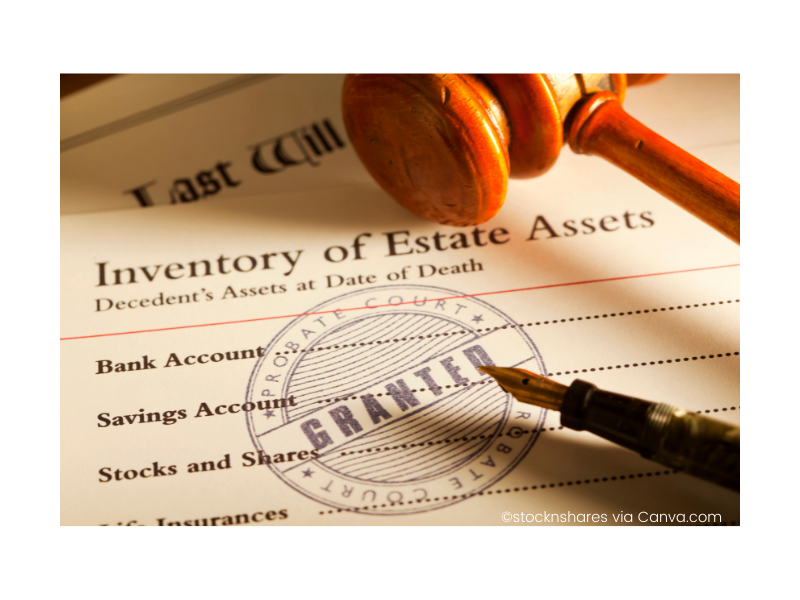If you are named as an executor on a will, then when that person dies it will be your duty to administer the estate. The first step in administering an estate is usually to apply for probate.
What is Probate?
A Grant of Probate in England, Wales and Northern Ireland, (or a Grant Confirmation in Scotland) gives you the legal right to deal with the estate of someone who has died.
To be granted probate you will need to apply to the Probate Office. They will post out the Grant of Probate after they have processed your application. This can take weeks to months, depending on the complexity of the case.
When does it not apply?
You will probably not have to apply for probate if any one of these conditions apply to the estate:
- Joint Assets Only: If the estate is worth less than £1 Million and is being passed to a spouse, civil partner, or charity
- Less than £5,000: The value of everything that the deceased owned in their own name is worth less than £5,000: or
- There were only savings and no other assets such as property, vehicles etc.
Providing you are either named as an executor, or you have permission from the other next of kin, you can distribute the assets according to the wishes of the deceased.
When do I need to apply for a Grant of Probate?
Where the conditions above don’t apply, you’ll probably need to apply for a Grant of Probate.
Some banks or financial institutions might ask you for a Grant of Probate if an individual account holds as little as £5,000, others will release much larger sums. There isn’t one rule for how much money will trigger the need for probate, this depends on individual banks and financial institutions.
- If there’s a will and you’re named as executor then you can apply for grant of probate
- If there’s no will (the estate is left intestate) you can apply for Letters of Administration which give you legal right to administer the estate. We have an article called “What if there’s no Will?” to help with this.
Although there is no time limit on when you should apply for probate, you must file Inheritance Tax forms within six months of someone passing away. As this is a key part of the probate process, you might consider doing the two sets of forms together.
Can I apply for by myself?
Yes, you can. Applying for probate is relatively straightforward when the estate is simple and the terms of the will are clear. The forms are available online and to download (see the Further Reading section below).
If you are thinking about DIY probate use Settld’s award winning service for fast-track preparation of Probate. We can help fill in the probate application. Distribute the estate to beneficiaries faster and avoid hours of admin.
When should I get help?
If the estate is complicated then legal advice might be helpful. It’s worth seeking help if any of the following apply:
- The terms of the will are unclear
- Some/all of the beneficiaries are under 18 years of age
- There are funds held in a trust
- There is property abroad
- The person who died owned a business
- Anyone is likely to dispute the will
- If there is an unreasonable delay in dealing with the estate or executors appear to have misused their legal powers
Legal fees for this help can be paid from the estate.
Who can help me with probate?
For simpler probate applications Settld now offer a DIY probate service.
Alternatively, where there are complex arrangements around the Estate or if Inheritance tax advice is required, a specialist solicitor, paralegal or accountant can help. Alternatively, banks often provide probate and administration services.
Banks are likely to be more expensive than solicitors and accountants. There are a number of Probate Specialists who make this type of work their sole activity and who offer a cheaper fixed fee service as a result. It’s worth shopping around and you should always get an estimate or a quote before instructing a professional to help you.
Look for firms that are licensed. There are professional qualifications which may reassure you that the person dealing with the estate is experienced and qualified to do so.
Licensed Solicitors and paralegals will have one or both of the following and are regulated by the CLC – the Council for Licensed Conveyancers:
- WIQS – Wills and Inheritance Quality Scheme
- STEP, where full members use the letters TEP (Trust and Estate Practitioner) after their name
Licensed Accountants must have a probate license from the ICAEW (The Institute of Chartered Accountants in England and Wales) for this “reserved legal activity”. There are a limited number of licensed accountants in this field, so it is probably worth checking that the firm you want to use has this license.
Settld can help you navigate through your options. As part of our award winning probate preparation service we offer a free no obligation call from an approved probate specialist.
How much will it cost to use a solicitor or accountant?
Fees are usually calculated in one of three ways:
- As a Fixed Fee, starting from as little as £300 for simple estates
- As an Hourly Charge. You should get an estimate of how much the overall price will be before the work begins.
- As a Percentage of the Value of the Estate, plus VAT. These charges tend to range between 1% and 2%.
You may also have to pay for court or application fees, which will make the complete cost higher, so check this at the beginning of your discussions.
What is the Process?
The process of gaining a grant of probate involves:
- Valuing the estate including properties, bank, savings, credit cards, loans and investments, service accounts such as utilities etc.
- Telling HMRC how much the estate is worth
- Completing the probate forms (online or by post) and paying the Probate Fee of £273 unless the estate is worth less than £5,000 in which case it’s free. At the same time you must:
- Complete Inheritance Tax forms and paying any tax due
- Administering the estate (after the Probate Application is complete)
- Place an Advert in The Gazette
- Gathering in the assets or their value
- Distributing inheritances to the beneficiaries
We describe each part of the process in more detail below:
Doing Probate Yourself – Preparing for Probate
Before you apply for probate you need to get the paperwork together, value the estate and tell HMRC what it’s worth. The following sections describe how this works.
-
Gather The Paperwork
You’ll need a copy of the Will and any Codicils or letters of wishes from the person who died.
A Codicil is an addition or supplement that explains, modifies, or revokes a will or part of one
Having birth, death and marriage certificates is helpful. For some of these documents you will need a number of Certified Copies.
Certified Copies are when a solicitor or an accountant has verified that a copied document exactly matches the original. They will sign, date and stamp the copy to prove that it is the same.
-
Value the Estate
Valuing the Estate means working out the value of everything owned by the person who passed away.
This includes all the assets (things with a positive value) minus liabilities (accounts where money is owed) to get a final figure in money. This includes valuing houses, cars, jewellery, bank and other types of account, savings, investments etc.
You can use estate agents to help value property. They will also be able to recommend removals firms and charities in your local area to empty residential property and get it ready for sale.
It may be helpful to make a list of all the assets and liabilities belonging to the person who died and keep track of the total.
-
Inform Service Providers and Financial Organisations
In order to do this, you will need to contact each organisation that the deceased had an account with to tell them that the person has died and ask them for a final balance, dated on the day they passed away.
Settld can help you both to tell companies when someone has died, and to obtain date of death balances. Our service is free to members of the public and we interface with over 750 different organisations – from banks to utility companies to social media providers and magazine subscriptions – so instead of contacting each provider separately, you will only need to fill in our online form and provide documentation once.
If you’re not sure what accounts were open, then Settld can also help you work out what needs closing from a bank statement. Call our customer service team for advice. Visit our website www.settld.care or you can email support@settld.care or call us on 0333 111 1111 (9am-5pm, Monday to Friday).
Or save time and money using Settld to close all accounts and help prepare probate. Click here for more details.
Once you have all the balances for each account held by the person who passed away, you can contact HMRC to find out if Inheritance tax applies.
-
Complete the probate forms
One you have valued the estate, you can apply for probate either:
- online (see the link in Further Reading); or
- Completing the paper forms and posting these into The Probate Office.
You will also need to sign a “Statement of Truth” declaring that the details you’ve provided are correct.
The fee for applying for probate yourself is £273 in England and Wales. It’s free if the estate is worth less than £5,000. (In Northern Ireland it costs £261). In Scotland Grant of Confirmation for Estates valued above £50,000 up to £250,000 is £276 (above that it’s £554).
Extra copies of the Probate Grant, they will cost £1.50.
-
Complete Inheritance Tax Forms
You need to complete an Inheritance Tax Form as part of the Probate application process. We have an article on Inheritance Tax with more information.
There are two types of Inheritance Tax form:
- IHT 205 applies if there is no tax to pay and there are no assets abroad
- IHT 400 is used when there is tax to pay or the estate is complex
You will still have to complete the forms and tell HMRC about the value of the estate, even if it is only worth £5,000, unless one of the exemptions above applies.
As a general rule, Inheritance Tax only applies to estates that are worth over £325,000. It may apply where a spouse inherits assets that are worth over £1Million. In these cases, it may be worth getting advice from a probate practitioner.
The link in Further Reading, below, takes you to a calculator to show what tax is likely to apply to the estate.
-
Pay the Inheritance Tax
Once HMRC has accepted your figures, you will need to pay the tax bill. You won’t be granted probate until the tax is paid.
If the bank account of the person who’s died has sufficient funds, you can apply to pay the tax directly to HMRC (using form IHT423). HMRC will also allow estate administrators to pay in installments, but will require 10% of the total bill in advance.
-
Place an Estate Notice in The Gazette
You may want to consider placing an official notice of the death in a local paper and in The Gazette. This allows unidentified creditors to be paid anything they are owed. If you don’t do this before the estate is administered, and all the assets are distributed, then you may end up being personally liable for that amount.
-
Administer the Estate
After you have the grant of probate, you can administer the estate, settle any debts and pay inheritances to the beneficiaries of the will.
At Settld, we specialise in simplifying the process of end-of-life administration. Our service is free to members of the public and is designed to make it easy for you to notify companies when a loved one has died, and request closure, transfer or amendment of their accounts. All you have to do is fill in a simple online form.
If you’d like to know more about Settld and how we can help, visit our website www.settld.care or you can email support@settld.care or call us on 0333 111 1111 (9am-5pm, Monday to Friday)
Further Reading:
- Gov.UK advice
- Gov.UK Inheritance Tax Calculator
- Money saving expert – Guide to Probate
- Which – Intestacy rules
- Which – Grant of Probate
- Which – DIY probate
- Citizens advice – dealing with the financial affairs of someone who’s died





